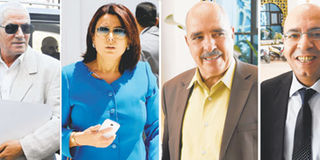Tunisian activists win Nobel Prize

A combo of recent file pictures shows (L to R) Secretary General of the Tunisian General Labour Union (UGTT) Houcine Abbassi, President of the Tunisian employers union (UTICA) Wided Bouchamaoui, President of the Tunisian Human Rights League (LTDH), Abdessattar ben Moussa and Tunisian lawyer Fadhel Mahfoudh. Tunisian mediators of the so-called National Dialogue Quartet (Tunisian General Labour Union UGTT, Tunisian Confederation of Industry, Trade and Handicrafts UTICA, Tunisian Human Rights League LTDH and Tunisian Order of Lawyers) won the 2015 Nobel Peace Prize, the Norwegian Nobel Commitee announced on October 9, 2015. photo | afp
What you need to know:
Democracy remains fragile in Tunisia which has been rocked by bloody attacks by Islamic State group jihadists this year
Oslo. Tunisian civil society groups won the Nobel Peace Prize on Friday for helping to create the only democracy to emerge from the Arab Spring, at a time when the country is under threat from jihadist violence. The Nobel panel said the award to the National Dialogue Quartet was intended as an “encouragement to the Tunisian people” and as an inspiration for others, particularly in the turbulent Middle East.
The award drew praise from around the world as a “beacon of hope” for the region, while one winner said it was a tribute to the “martyrs” who died in the struggle to move the north African country from dictatorship to democracy.
The committee hailed the quartet’s “decisive contribution to the building of a pluralistic democracy in Tunisia in the wake of the Jasmine Revolution of 2011,” chairwoman Kaci Kullmann Five said.
“The Norwegian Nobel Committee hopes that this year’s prize will contribute towards safeguarding democracy in Tunisia and be an inspiration to all those who seek to promote peace and democracy in the Middle East, North Africa and the rest of the world,” the panel said.
During the wave of unrest which erupted in January 2011 after the death of a young jobless university graduate who had set himself on fire in protest over police harassment and unemployment, more than 300 people were killed. Tunisia’s powerful General Labour Union, one of the quartet members, described it as a “tribute to martyrs of a democratic Tunisia.”
“This effort by our youth has allowed the country to turn the page on dictatorship,” said union head Houcine Abassi.
Democracy remains fragile in Tunisia, however, which has been rocked by bloody attacks by Islamic State group jihadists this year and some high-profile political killings.
EU foreign policy chief Federica Mogherini said the award showed the Middle East and North Africa “the way out of the crises in the region: national unity and democracy”.
President Francois Hollande of France said it “rewards the success of the democratic transition in Tunisia, while British Prime Minister David Cameron said it helped make Tunisia a “beacon of hope” for the region.
“The prize is a tribute and a call to support all civil society forces engaged in the fight for democracy, pluralism and rule of law,” added UNESCO chief Irina Bokova.
The Quartet was formed in 2013 when the process of democratisation was in danger of collapsing because of widespread social unrest, “establishing an alternative, peaceful political process” (AFP)




